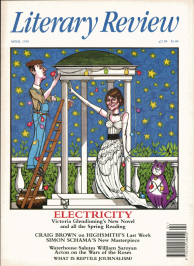Geoff Nicholson
Likeable, Readable and Deceptively Profound
High Fidelity
By Nick Hornby
Gollancz 256pp £14.99
The paradox at the centre of High Fidelity is that while pop songs almost always involve love, passion and raw feeling, the kind of men who are most intensely addicted to pop music tend to be a bunch of loveless, passionless, unfeeling train spotters. Hornby sees a problem here.
The book’s hero and narrator is Rob Fleming, a man who thinks you can’t be a ‘serious person’ if you own less than five hundred albums. His is a slightly unusual case, however, since he’s the owner of a specialist record shop and is an occasional DJ.
He defines himself and others in terms of musical preferences. His own tastes run to the self-dramatising mainstream. His favourite songs include ‘Only Love Can Break Your Heart’, ‘Last Night I Dreamed That Somebody Loved Me’ and ‘Love Hurts’; sensitive boys’ music. He wouldn’t dream of socialising with anyone who loved Kate Bush or Billy Joel or Tina Turner.
The extent to which this kind of intense but low-level snobbery makes sense to you is the extent to which you will understand and like this book.
The story is simple enough. Boy lives boringly but apparently happily with girl. Girl gets fed up and moves out. Boy reorganises his record collection. Girl’s father dies. Girl decides her old boyfriend wasn’t so bad after all and moves back.
Fleming, the thirty-five-year-old ‘boy’ in all this, suffers genuinely but blokeishly, and Hornby’s sympathy for his hero may not be shared by all readers. Hornby sees the absurdity of his character, but the satire is fairly gentle. What makes the story compelling, however, is the high recognition factor. Few of us would be so foolish as to admit to seeing ourselves in the hero, but we’d all happily admit to knowing lots of people just like him.
Hornby is also excellent on the texture of a certain sort of metropolitan, deracinated, thirtysomething, uncomplicatedly heterosexual existence. He’s good at describing excruciating dinner parties, Sunday visits to parents, meeting up with old girlfriends.
However. he’s much better with his male characters than his female ones. The guys who work in the record shop, one of them a would-be pop star, the other an obsessive collector, are painfully accurate and familiar. And there’s a terrific little set piece where Rob tries to ‘celebrate’ his birthday in the company of a couple of lumpen drinking pals.
The women are less convincing. Laura, the erring girlfriend, is disappointingly insipid, and I didn’t believe at all in Maria, a country-and-western singer with whom Rob shares brief solace’ But perhaps this is to be expected. The book’s narrator would be the first to admit he doesn’t understand women.
In the course of the plot Hornby and his narrator come across another paradox, namely that when you’re sixteen pop music is able to articulate every thought and feeling you’ve ever had. However, by the time you’re thirty-five, unless you’re a complete emotional cripple, it can’t do that any more. That, I suppose, is a moment when you might turn to some other art form for consolation – the novel for instance, although this isn’t a conclusion the novel comes to.
The book’s final scene has all the characters dancing at a disco to golden oldies, songs like ‘Route 66’, ‘Twist and Shout’, ‘In the Midnight Hour’, ‘Long Tall Sally’, songs that Rob Fleming calls ‘naff and recognisable, and … guaranteed to please a crowd of thirtysomethings who think that hip hop is something their children do in music and movement classes.’
Again, depending on your tastes, you may see this as a dance to the music of time or perhaps a danse macabre. What Hornby certainly seems to be telling us is that pop music can all too easily be transformed from an expression of emotion into an exercise in nostalgia, and that it may function most effectively not as an expression of feeling but as retreat from it. Not that Nick Hornby would ever dream of writing anything as highfalutin or as unblokeish as that.
This is a witty, good-natured, occasionally very funny book. Nick Hornby has written a likeable, readable and deceptively profound novel.

Sign Up to our newsletter
Receive free articles, highlights from the archive, news, details of prizes, and much more.@Lit_Review
Follow Literary Review on Twitter
Twitter Feed
The era of dollar dominance might be coming to an end. But if not the dollar, which currency will be the backbone of the global economic system?
@HowardJDavies weighs up the alternatives.
Howard Davies - Greenbacks Down, First Editions Up
Howard Davies: Greenbacks Down, First Editions Up - Our Dollar, Your Problem: An Insider’s View of Seven Turbulent...
literaryreview.co.uk
Johannes Gutenberg cut corners at every turn when putting together his bible. How, then, did his creation achieve such renown?
@JosephHone_ investigates.
Joseph Hone - Start the Presses!
Joseph Hone: Start the Presses! - Johannes Gutenberg: A Biography in Books by Eric Marshall White
literaryreview.co.uk
Convinced of her own brilliance, Gertrude Stein wished to be ‘as popular as Gilbert and Sullivan’ and laboured tirelessly to ensure that her celebrity would outlive her.
@sophieolive examines the real Stein.
Sophie Oliver - The Once & Future Genius
Sophie Oliver: The Once & Future Genius - Gertrude Stein: An Afterlife by Francesca Wade
literaryreview.co.uk